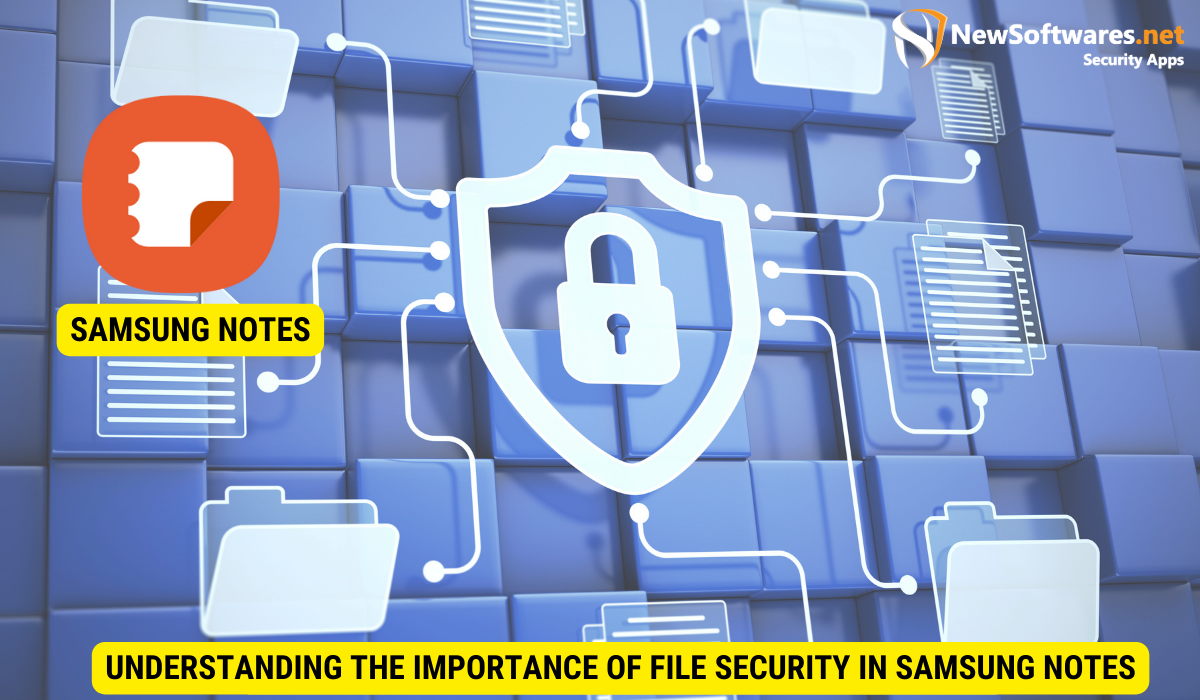Securing files by locking folders in Samsung Notes is a crucial step in protecting your sensitive information from unauthorized access. By following a few simple steps, you can enhance your file security and reduce the risk of data breaches or privacy violations.
In today’s digital age, file security has become a top priority for individuals and businesses alike. With sensitive information stored on our smartphones and tablets, it’s crucial to take necessary measures to ensure that our files are secure and protected. Samsung Notes, a popular note-taking app, provides users with the ability to lock folders, adding an extra layer of security to their important documents, photos, and other files. Together, we will explore the importance of file security, the role of Samsung Notes in protecting your data, and a step-by-step guide to locking folders in the app.
Understanding the Importance of File Security

File security is essential to safeguarding your personal and confidential information. Whether it’s your financial records, personal photos, or important work documents, unauthorized access to these files can have serious consequences. Identity theft, data breaches, and privacy violations are just a few of the risks associated with unsecured files.
The Risks of Unsecured Files
Unsecured files are vulnerable to various threats, such as hackers, malware, and physical theft. Cybercriminals are constantly looking for ways to exploit security vulnerabilities and gain unauthorized access to valuable information. By locking folders in Samsung Notes, you can significantly reduce the risk of your files falling into the wrong hands.
Moreover, unsecured files can also lead to reputational damage and financial loss. Imagine the impact of sensitive business documents being leaked to competitors or personal photos being shared online without your consent. The consequences can be far-reaching and devastating, underscoring the critical importance of file security in today’s digital age.
The Role of Samsung Notes in File Security
Samsung Notes is a powerful app that offers users a range of features to enhance their note-taking experience. One of its key functionalities is the ability to secure and protect your files. By utilizing encryption algorithms, Samsung Notes ensures that your data remains encrypted and inaccessible to anyone without the correct security credentials.
In addition to encryption, Samsung Notes also provides options for biometric authentication, such as fingerprint or facial recognition, adding an extra layer of security to your files. This multi-factor authentication approach further strengthens the protection of your sensitive information, giving you peace of mind knowing that your files are safe from unauthorized access.
An Overview of Samsung Notes
Before we dive into the process of locking folders in Samsung Notes, let’s take a closer look at the app and its key features.
Samsung Notes is a robust note-taking application designed to enhance productivity and creativity. Whether you’re jotting down ideas, sketching diagrams, or recording audio memos, this versatile app offers a comprehensive platform for capturing and organizing your thoughts. With a user-friendly interface and seamless integration across Samsung devices, Samsung Notes is a go-to tool for individuals seeking a digital workspace that adapts to their needs.
Key Features of Samsung Notes
Samsung Notes offers a wide array of features to improve your note-taking and file management experience. From handwritten notes to audio recordings, the app provides a versatile platform for capturing and organizing your thoughts. Some key features include:
- Handwriting recognition
- Text formatting options
- Image and PDF annotation
- Syncing across devices
Moreover, Samsung Notes integrates seamlessly with the S Pen stylus, allowing users to unleash their creativity and precision when crafting digital notes or sketches. The app’s intuitive design and customizable settings empower users to personalize their note-taking experience, making it a preferred choice for both casual users and professionals alike.
The Functionality of Folders in Samsung Notes
Folders are a fundamental organizational tool in Samsung Notes, allowing you to categorize and group related files together. By creating folders, you can easily locate specific files and streamline your workflow. Additionally, folders provide an excellent means of organizing and securing your sensitive data.
Furthermore, Samsung Notes enables users to customize their folders with color-coding and labeling options, enhancing visual organization and accessibility. This feature not only adds a personal touch to your digital workspace but also helps in quickly identifying and retrieving specific notes or files. By leveraging the folder functionality in Samsung Notes, users can maintain a structured and efficient system for managing their digital content.
The Process of Locking Folders in Samsung Notes
Now that you understand the importance of file security and have a grasp of Samsung Notes’ features, let’s explore the process of locking folders within the app.
Ensuring the confidentiality and security of your digital files is paramount in today’s interconnected world. Samsung Notes offers a convenient solution by allowing users to lock specific folders, providing an added layer of protection for sensitive information.
Preparing Your Files for Locking
Before you begin locking your folders, it’s essential to ensure that the files you want to secure are properly organized within the app. Take some time to categorize your files into relevant folders, making it easier to locate and manage them in the future.
Organizing your digital workspace not only enhances efficiency but also streamlines the process of securing your data. By structuring your files into distinct folders based on projects, categories, or themes, you can easily identify the content that requires protection.
Step-by-Step Guide to Locking Folders
Locking folders in Samsung Notes is a straightforward process. Follow these simple steps to secure your files:
- Open the Samsung Notes app on your device.
- Navigate to the folder you want to lock.
- Tap and hold the folder to reveal a context menu.
- Select the “Lock” option from the menu.
- Set a password or use biometric authentication to unlock the folder in the future.
By following these steps, you can safeguard your confidential information and maintain peace of mind knowing that your files are protected from unauthorized access.
Troubleshooting Common Issues
While locking folders in Samsung Notes is generally a seamless process, you may encounter some issues along the way. Here are a few common problems and their solutions:
Dealing with Forgotten Passwords
If you forget the password to your locked folder, don’t panic. Samsung Notes provides an option to reset your password. However, be aware that resetting the password will permanently delete all files within the locked folder.
Resolving Locking and Unlocking Issues
If you experience difficulties locking or unlocking folders, ensure that you have the latest version of the Samsung Notes app installed. If the issue persists, try restarting your device or reaching out to Samsung support for further assistance.
Additional Security Measures for Samsung Notes

While locking folders in Samsung Notes provides a significant level of file security, there are additional measures you can take to further protect your data.
Using Biometric Authentication
Samsung devices offer biometric authentication options, such as fingerprint or facial recognition, to enhance the security of your locked folders. By enabling these features, you can ensure that only authorized individuals can access your files.
Regularly Updating Your Samsung Notes App
Keeping your Samsung Notes app up to date is essential for maintaining optimal security. Developers frequently release updates that address security vulnerabilities and enhance the overall performance of the app. Make it a habit to check for updates regularly to ensure you have the latest security features.
Key Takeaways
- File security is essential in the digital age.
- Samsung Notes provides the ability to lock folders, adding an extra layer of security to your files.
- Organize your files into folders for easier management and protection.
- Follow a step-by-step guide to lock folders in Samsung Notes.
- Consider additional security measures such as biometric authentication and regular app updates.
FAQs
1. Can I lock individual files within a folder in Samsung Notes?
No, Samsung Notes currently does not provide the option to lock individual files within a folder. However, you can lock the entire folder, ensuring that all files within it are protected.
2. What happens if I forget the password to a locked folder?
If you forget the password to a locked folder in Samsung Notes, you have the option to reset the password. However, resetting the password will result in the permanent deletion of all files within the locked folder.
3. Can I access my locked folders from other devices?
Yes, if you have Samsung Notes installed on multiple devices and are logged in with the same account, your locked folders will be accessible across all devices.
4. Can I unlock a folder with my fingerprint?
Yes, if your Samsung device supports biometric authentication, such as fingerprint recognition, you can unlock your folders using your fingerprint.
5. Is Samsung Notes available on all Samsung devices?
Samsung Notes is pre-installed on most Samsung devices and is compatible with a wide range of models. However, it’s always a good idea to check if your specific device supports the app.
Conclusion
Securing your files is of utmost importance in today’s digital landscape. By locking folders in Samsung Notes, you can protect your sensitive information from unauthorized access. Take advantage of the app’s features and follow the step-by-step guide provided to enhance your file security. Additionally, consider implementing biometric authentication and regularly updating your Samsung Notes app for maximum protection. By following these practices, you can ensure that your important files remain safe and confidential.
